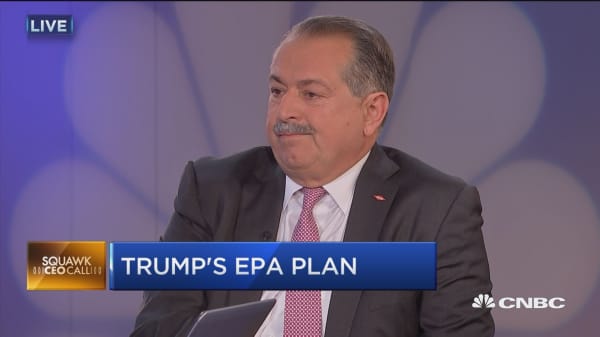Brace yourselves. The U.S. may be soon experience a severe case of regulatory whiplash.
With the incoming Trump administration and Republican Congress committed to rolling back a wide swath of federal regulations, hundreds of rules covering everything from food labeling to overtime pay could be eliminated in the next few months.
The latest signal that the Trump administration plans to roll back rules and regulatory policies put in place by President Barack Obama came Thursday with the choice of Oklahoma Attorney General Scott Pruitt to serve as head of the U.S. Environmental Protection Agency.
Pruitt has been a fierce critic of the EPA, and has been tied to the oil and gas industry, which aligns with Trump's signaling of an interest in loosening energy regulations.
"Environmental protection, what they do is a disgrace; every week they come out with new regulations," Trump said during a television interview earlier this year.
Among the Obama administration's major accomplishments was a sweeping series of environmental regulations governing everything from clean air and water to greenhouse gas emissions and auto fuel efficiency.
But those regulations could be just the start of a wave of deregulation not seen since the Reagan administration overturned decades of regulations governing industries from transportation to telecommunications.
Dozens of major regulations, overseen by almost every White House department and affecting millions of employers, consumers, workers, retailers, investors, retirees and other groups, are potentially subject to reversal.
There are several forces shaping up to produce a tsunami of federal deregulation. One is the stark shift in policies advanced by Obama and the campaign pledges of his successor. Trump's promises to roll back regulations are made easily by the GOP control of Congress.
There are also more rules subject to reversal. Thwarted by relentless GOP opposition to implementing policy through legislation, the Obama administration has recently resorted to applying executive rule-making powers to advance its agenda.
That leaves its most recently enacted rules especially vulnerable to reversal, thanks to a relatively obscure provision of the 20-year-old Congressional Review Act than was enacted as part of the Republican led "Contract with America" during the Clinton administration.
Under that law, Congress can undo any regulations that are pending — or have only been finalized within the last 60 "legislative days" (defined as days when Congress is officially in session).
Some on Capitol Hill saw this coming as far back as February, when the Congressional Research Service weighed in with guidance on how the law could be applied
Under the law, there are multiple timelines that create windows of opportunity for a Republican rule rollback, but the CRS said rules finalized as far back as May 31 of this year could be fair game for a regulatory hit list.




